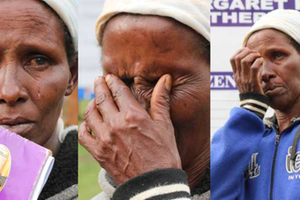
The Social Health Authority building, Nairobi in this picture taken on October 6, 2024.
As Kenyans express their frustrations over the first Social Health Insurance Fund (SHIF) deductions from their pay this month, some patients have continued to experience challenges accessing care in the new system.
Those who have received their payslips this month have taken to social media to vent out on the impact of the deductions on their already strained finances.
Social media platforms and workplace discussion groups are awash with Kenyans voicing frustration over what they view as excessive cuts in their pay.
Since the transition from the National Health Insurance Fund (NHIF) to SHIF on October 1, the new system has come under intense scrutiny. Some Kenyans have shared about their challenges while others have expressed scepticism about whether they will receive sufficient healthcare benefits in return.
While the government has promoted SHIF as a long-term solution to enhance healthcare access and affordability, Kenyans are uncertain if the financial sacrifices will be met with adequate health coverage.
Strained finances
Under the now-defunct NHIF, the maximum contribution was capped at Sh1,700. However, under the new Social Health Authority (SHA), individuals are now required to contribute 2.75 per cent of their household income, a steep rise that is squeezing already strained finances.
Many employees feel that the deductions are a steep price to pay without clear guarantees of quality healthcare.
A parent, Annastia Akinyi, who spoke to Sunday Nation, said it is expensive to cater for children with disabilities because of the high cost of medication.
“It is very upsetting. Most medications for children with disabilities are not covered under this insurance. You pay cash. One would expect that the deduction towards SHA, which is so high, would instead have gone to buying medicine. You wonder just how they expect people needing these medicines are to get them,” Ms Akinyi said.
She said that after SHA took effect, there has been a hefty cut in her October salary.
“The amount deducted is more than half of what I spend on my daughter’s crucial medication which she must take daily and is not covered by insurance. How are we supposed to get the medicine?” She asked.
“We need to be told how we are going to get the drugs. Why should we be deducted such a huge amount yet our children cannot access vital medicine? The money being deducted is enough to pay for my daughter’s medicine,” she added.
Kenya Network of Cancer Organisations Executive Director Pheobe Ongadi said that when SHIF was launched, patients had high expectations that it would have expanded benefits. But, so far, it has been a disappointment, she said.
“Unfortunately, to our disappointment, SHIF has made our patients suffer. They have gone through a lot of pain. We have been receiving calls from stranded patients who are still being asked to pay upfront treatment. Cancer treatment is very weighty and challenging. We should not put them through such trauma,” said Ms Ongadi, whose organisation has 62 registered groups.
She urged the government to close the gaps in the transition to prevent further harm to the health and wellbeing of cancer survivors as the disruption of essential services is a violation of their right to health and life.
“Cancer treatment is a race against time and the more we put their treatment on hold, the more complicated it will be in future to treat the disease,” Ms Ongadi said.
She also asked for clarity in terms of the reimbursement that SHIF is giving to hospitals after cancer treatment.
“When you looked at the National Health Insurance Fund, it was very clear that it was remitting Sh25,000 per session for chemotherapy, but now for SHIF, patients are being asked to top up half of the money for treatment. Can SHIF be clear on the amount and sessions for cancer treatment,” the official said.
“It may be one of the best decisions but the transition and planning was hurriedly done and at the end of the day, many people are affected,” she added.
National Cancer Institute Chief Executive Officer Dr Elias Melly said they recognise that patients are facing problems.
“We are having serious discussions in the Ministry of Health to see how the Sh400,000 allocated for cancer treatment can be enhanced. The available fund for treatment might not be adequate for some cancers, but the amount could be enough if one gets treatment in a public facility,” he said.
“The amount will be reviewed. We will make decisions on how best to address the issues so that patients can receive treatment. There is hope,” he added.
A Nairobi-based teacher Sarah Wambui said she now has less money for her daily expenses following the SHIF deductions but does not know what benefits she will be getting in the new health scheme.
Other Kenyans have expressed concern about the timing of the SHIF implementation. With rising inflation and a challenging economic landscape, many argue that these new deductions only add to the financial burden for households already struggling to make ends meet.
“It feels like an additional tax yet there is no clear plan on how it benefits us. We need to know that our money is being put to good use. Otherwise, we’re just being drained financially with little to show for it,” a worker in a retail store in Kisumu, Peter Omondi, said.
The Ministry of Health and the government have defended the SHIF plan, explaining that it is a necessary step towards ensuring universal healthcare cover for all Kenyans.
Since the launch of SHA, they have emphasised that once fully implemented, it will offer a more comprehensive healthcare package, covering essential treatments and consultations across both public and private hospitals.
To address public concerns, the government has promised to establish a transparent reporting mechanism detailing SHIF's impacts on healthcare service delivery. However, complaints about challenges facing the new health plan have continued.







